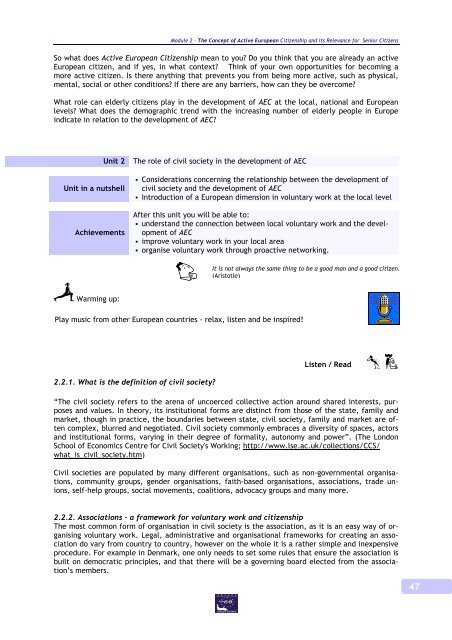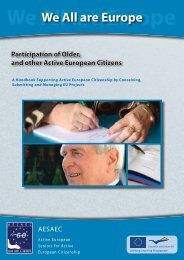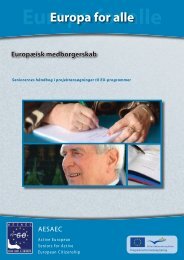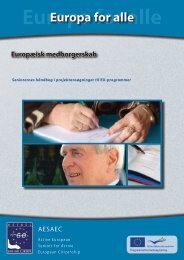We All are Europe - AESAEC
We All are Europe - AESAEC
We All are Europe - AESAEC
You also want an ePaper? Increase the reach of your titles
YUMPU automatically turns print PDFs into web optimized ePapers that Google loves.
Module 2 – The Concept of Active <strong>Europe</strong>an Citizenship and its Relevance for Senior Citizens<br />
So what does Active <strong>Europe</strong>an Citizenship mean to you Do you think that you <strong>are</strong> already an active<br />
<strong>Europe</strong>an citizen, and if yes, in what context Think of your own opportunities for becoming a<br />
more active citizen. Is there anything that prevents you from being more active, such as physical,<br />
mental, social or other conditions If there <strong>are</strong> any barriers, how can they be overcome<br />
What role can elderly citizens play in the development of AEC at the local, national and <strong>Europe</strong>an<br />
levels What does the demographic trend with the increasing number of elderly people in <strong>Europe</strong><br />
indicate in relation to the development of AEC<br />
Unit 2<br />
Unit in a nutshell<br />
Achievements<br />
The role of civil society in the development of AEC<br />
Considerations concerning the relationship between the development of<br />
civil society and the development of AEC<br />
Introduction of a <strong>Europe</strong>an dimension in voluntary work at the local level<br />
After this unit you will be able to:<br />
understand the connection between local voluntary work and the development<br />
of AEC<br />
improve voluntary work in your local <strong>are</strong>a<br />
organise voluntary work through proactive networking.<br />
It is not always the same thing to be a good man and a good citizen.<br />
(Aristotle)<br />
Warming up:<br />
Play music from other <strong>Europe</strong>an countries - relax, listen and be inspired!<br />
2.2.1. What is the definition of civil society<br />
Listen / Read<br />
“The civil society refers to the <strong>are</strong>na of uncoerced collective action around sh<strong>are</strong>d interests, purposes<br />
and values. In theory, its institutional forms <strong>are</strong> distinct from those of the state, family and<br />
market, though in practice, the boundaries between state, civil society, family and market <strong>are</strong> often<br />
complex, blurred and negotiated. Civil society commonly embraces a diversity of spaces, actors<br />
and institutional forms, varying in their degree of formality, autonomy and power”. (The London<br />
School of Economics Centre for Civil Society's Working; http://www.lse.ac.uk/collections/CCS/<br />
what_is_civil_society.htm)<br />
Civil societies <strong>are</strong> populated by many different organisations, such as non-governmental organisations,<br />
community groups, gender organisations, faith-based organisations, associations, trade unions,<br />
self-help groups, social movements, coalitions, advocacy groups and many more.<br />
2.2.2. Associations – a framework for voluntary work and citizenship<br />
The most common form of organisation in civil society is the association, as it is an easy way of organising<br />
voluntary work. Legal, administrative and organisational frameworks for creating an association<br />
do vary from country to country, however on the whole it is a rather simple and inexpensive<br />
procedure. For example in Denmark, one only needs to set some rules that ensure the association is<br />
built on democratic principles, and that there will be a governing board elected from the association’s<br />
members.<br />
47









